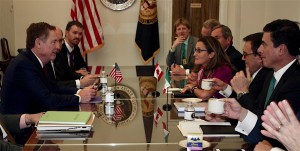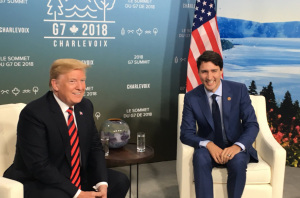
NAFTA talks between Mexico and the U.S. are done and the two sides have resolved their differences. Canadian representatives will resume negotiations now.
After negotiating through the weekend, trade representatives of Mexico and the United States reached agreement on the auto provisions of NAFTA. The two sides now must get approval from Canada to move forward.
Mexico’s top official Ildenfso Guajardo said last week the sides were nearly done and expected a deal to be completed this week. The deal has been a long time coming, oft delayed due to demands by President Donald Trump, who initially slammed the deal when talks began.
Much of the reason for the slow pace of the talks was due to Trump’s insistence on increasing the percentage of North American-made parts in vehicles imported into the zone. The current level is 62.5% and under the new accord, that rises to 75%, according to Reuters.
The deal also would require 40% to 45% of auto content to be made by workers earning at least $16 per hour, Reuters reported. Considering the average wage in Mexico is closer to $5 an hour, it’s likely those components will be made in the U.S., or perhaps, Canada.
(U.S., Mexico making incremental progress in NAFTA talks. Click Here for the story.)
Now the deal will need to be approved by Canada. Trump plans to use a heavy hand to make that happen.

President Donald Trump plans to call Canadian Prime Minister Justin Trudeau to encourage a quick resolution on NAFTA.
“I think with Canada, frankly, the easiest we can do is to tariff their cars coming in. It’s a tremendous amount of money and it’s a very simple negotiation. It could end in one day and we take in a lot of money the following day,” Trump said.
(Click Here to see why NAFTA talks halted earlier.)
Trump plans to call Canadian Prime Minister Justin Trudeau to discuss the deal. Canadian officials have been on the sideline, allowing Mexico and the U.S. to hammer out their differences with the idea to come in afterward.
Trudeau has already spoken to outgoing Mexican President Enrique Pena Nieto. The pair reaffirmed their commitment to completing a new deal that makes sense “for all three parties” the prime minister’s office said. Pena Nieto used Twitter urge Canada to return to the talks and get the deal done “this week.”
(To see more about Trump’s auto tariff threat triggering backlash, Click Here.)
In the meantime, Trump informed the U.S. Congress he expected to sign a deal within the next 90 days. This will ensure Pena Nieto can sign the deal before his term concludes at the November.

I like the deal headlines but of course wait to see the details. Why would Canada object to the terms publicly announced, at least with respect to auto?